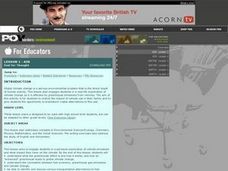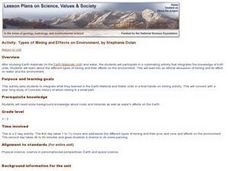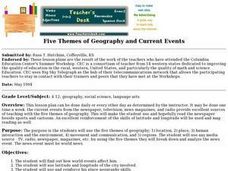Curated OER
Air: Fuel For Thought
Students consider the impact of vehicle use in their family and brainstorm viable alternatives to this use. They calculate the total emissions for their family cars during the week, then compare those totals with Hybrid car totals.
Curated OER
Sight
Students discover how the sense of sight helps us recognize each other and explore color, motion and distance.
Curated OER
Social Studies: Your Family Does What?
Sixth graders compare and contrast their own personal culture with that of Japan. They fill out questionnaires, compile the results, and match them with Japanese answers to the same forms. Students create a Venn diagram of the...
Curated OER
Castles and Forts of Wales and Oregon
Pupils compare a castle in Wales to a fort in Oregon and design and build a castle or fort. In this structure study lesson, students complete activities to study castles in Wales to forts in England. Pupils then design their own fort or...
Curated OER
Stay Well Cards
Students use ice-cube brushes to paint pictures demonstrating ways that they can stay healthy.
Curated OER
Snowball Soap
Students demonstrate healthy hand-washing techniques. They mix water and soap flakes, and create snow soap sculptures.
Curated OER
The Conscription Crises
Students explore roles played by Canada's prime ministers The Right Honorable Sir Wilfrid Laurier and The Right Honorable iam Lyon Mackenzie King with regards to the conscription crises of World War I and World War II.
Curated OER
If My Configurations are Correct
Students write the electron configuration of elements in the ground state. In this chemistry lesson, students draw how subatomic particles are arranged in the atom. They construct Lewis dot diagrams of valence electrons.
Curated OER
United States & Canada: How Are We The Same? How Are We Different?
Learners compare and contrast similarities and differences between Canada and the US. In this geography lesson, students read various articles and identify similarities and differences in economies, cultures, geography, climate,...
Curated OER
Five Themes of Geography and Current Events
Basically, pupils look for a current world event from a reputable source and identify the five themes of geography within it. Throughout the school year, they keep a notebook of these current events. A grading guideline is outlined, and...
Curated OER
Introduction to Ecology
Eighth graders identify the living and nonliving components of an ecosystem. In this ecology lesson, 8th graders explain the role each organism plays. They participate in class discussion and answer a quiz at the end of the lesson.
Curated OER
Trappers Then and Now
Students study how trapping in the Illinois Territory in the 1800's effected the beaver population in the state. They compare methods, rules and regulations of the 1800s to those of today. In groups, they research a variety of...
Curated OER
You say Avocado, I say Avogadro
Young scholars convert mole to mass to particles and vice versa. In this chemistry lesson, students discuss the importance of Avogadro's number. They apply what they have learned in a team competition.
Other
Wet in the City: A Recipe for Clean Water [Pdf]
In this hands-on lesson, students will examine the labels on common household products to determine what hazardess chemicals they contain, then test less toxic alternatives to see their affects on water quality. Students will also gain...
Other
Lunar and Planetary Institute: Explore! Discover Earth
A variety of hands-on activities, investigations, and explorations designed to engage learners in discovering planet Earth.
Alabama Learning Exchange
Alex: Beanie Baby Habitats Collaborative Project
With the booming market of "Beanie Baby" type stuffed animals being so prominent in students' lives, this project brings that interest into the classroom through the use of research, science, hands-on experiences, and technology. The...
Alabama Learning Exchange
Alex: What Can Shapes Be
This is a hands-on lesson plan that will help young scholars explore shapes in their environment. Students will work in diverse groups to complete this activity. Young scholars will make a class book of their findings.This lesson plan...













![Wet in the City: A Recipe for Clean Water [Pdf] Lesson Plan Wet in the City: A Recipe for Clean Water [Pdf] Lesson Plan](https://d15y2dacu3jp90.cloudfront.net/images/attachment_defaults/resource/large/FPO-knovation.png)

